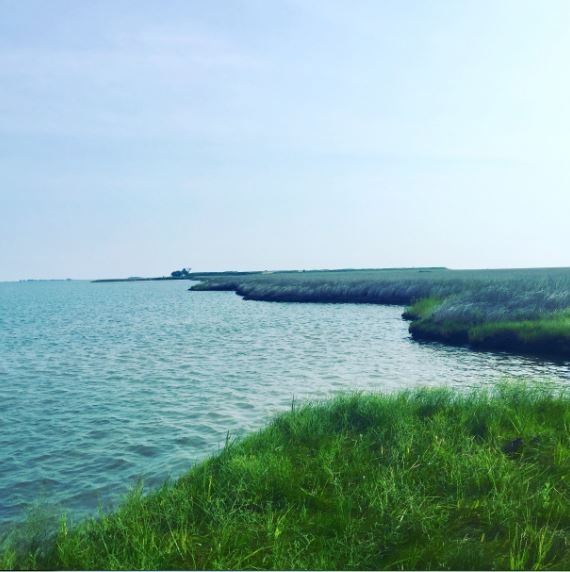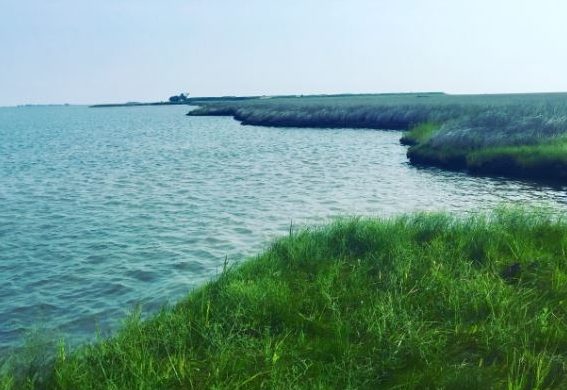There is but one entrance by sea into this country, and that is at the mouth of a very goodly bay, 18 or 20 miles broad. The land, white hilly sands like unto the Downs, and all along the shores rest plenty of pines and firs … Within is a country that may have the prerogative over the most pleasant places known, for large and pleasant navigable rivers, heaven and earth never agreed better to frame a place for man’s habitation. ~John Smith’s Chesapeake Voyages 1607-1609

I recently returned from one of the most extraordinary professional development opportunities I have ever had. Not only did I experience the majestic Chesapeake Bay in ways I could not have imagined, but I also learned a lot about myself.
In mid-July I had the privilege to attend the Environmental Leadership for Independent School Leaders conference held at the Smith Island Education Center. This conference is a unique partnership between the Chesapeake Bay Foundation (CBF), The Gunston School, the Association of Independent Maryland and DC Schools, the Association of Independent Schools of Greater Washington, and the Virginia Association of Independent Schools. I spent time immersed in bay field study – similar to the experiences of the Kent School 4th Graders who participate in a CBF trip annually – the only elementary grade invited to attend. I also spent time reflecting on environmental literacy and sustainability with 12 other school leaders and was motivated by what other schools are doing to educate students about the environment.
I was a little out of my comfort zone from the moment I arrived at Somers Cove Marina in Crisfield to meet the CBF boat with a sleeping bag and sneakers for the mud – I should have brought clothes for the mud but that is another story! When I originally applied for this cost-free conference generously funded by a foundation who supports CBF, I thought I was going to be on The Gunston School campus for three days and would be able to attend the Kent County Fair in the evenings. When I learned I would be staying in Tylerton on Smith Island the week before the trip (see what happens when you don’t read the entire email), I seriously panicked. The packing list alone intimidated me. Dormitory style rooms with bunk beds, flying and crawling bugs, heat, humidity and spotty wi-fi had the makings of a rough few days for me.
Living and working on the Chesapeake Bay for three days was an experience I will never forget. I spoke with many lifelong Smith Islanders, including our boat captain Jessie Marsh, and learned about the history of the island, the waterman’s way of life, crabbing, erosion and sea level rise. I visited the school on Ewell where Principal/Teacher Jane Evans teaches nine students in PK – Grade 7. I ate Smith Island Cake baked by Mary Ada Marshall. I kissed a fish for luck, twisted and squished it to bait my crab trap, set the trap by boat, hauled it up the next day and caught five crabs. There is photographic proof! And, I went proggin’ on Long Branch.
Progging – “the action or process of foraging, delving; searching or hunting about, especially for timber or food, and specific to the Chesapeake Bay area” (Oxford English Dictionary) – known fondly as proggin’ – was an inspiring early morning activity on our final day. As we walked along the edge of a beautiful and uninhabited island salt marsh searching for treasure, I delighted in finding deep blue bay glass, broken bits of civil war era porcelain, buttons and relatively recent pieces of pottery. Proggin’ stirred memories of combing for sea glass as a young girl in Marshfield, Massachusetts, where my grandparents had a cottage. I grew up spending hours crouched on the sandy beach in search of illusive blue and green sea glass.
Proggin’ is a great metaphor for life. A reflective, longterm process whereby one searches for information or answers to tough questions, learns a new concept by reading or attending a class, or experiences something for the first time. Proggin’ on the Chesapeake Bay last week changed me in a profound way as I held in my hands forgotten remnants of the past in a land seemingly untouched by time. I will never look at the Bay quite the same again. Living and working on Smith Island, although only for a brief time, not only taught me about the eco-system and economy of the Bay but also taught me the importance of perseverance, tenacity and resilience. And, that is exactly why at Kent School we believe Chesapeake Bay studies with CBF, Sultana Education Foundation and the National Aquarium, and outdoor educational experiences at the Echo Hill School and the Mountain Institute are essential for our students – and for the adults who teach them.
Nancy Mugele is the Head of School at Kent School in Chestertown and a member of the Board of Horizons of Kent and Queen Anne’s.



Write a Letter to the Editor on this Article
We encourage readers to offer their point of view on this article by submitting the following form. Editing is sometimes necessary and is done at the discretion of the editorial staff.